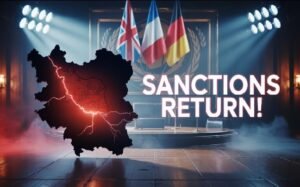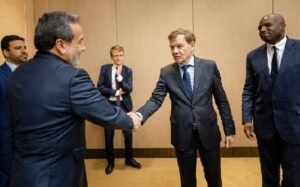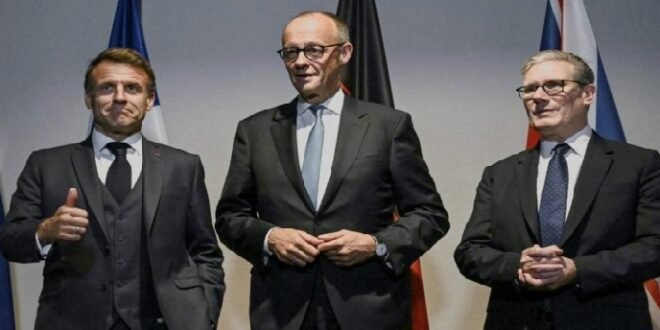21-09-2025
PARIS/ BRUSSELS: France’s President Emmanuel Macron said major European nations will likely reimpose international sanctions on Iran by the end of the month.
When asked in an interview on Israel’s Channel 12 on Thursday if the so-called “snapback” sanctions would be triggered, Macron responded in the affirmative, claiming that Iran’s efforts to avoid them were “not serious”.
 In late August, France, Germany and the United Kingdom, known as the E3, initiated a 30-day process to reimpose sanctions in the absence of a negotiated deal on the Iranian nuclear program.
In late August, France, Germany and the United Kingdom, known as the E3, initiated a 30-day process to reimpose sanctions in the absence of a negotiated deal on the Iranian nuclear program.
Iran has called the E3’s decision “unjustified, illegal and lacking any legal basis”.
The three European powers accuse Iran of breaching the 2015 nuclear agreement, officially called the Joint Comprehensive Plan of Action (JCPOA).
Under the deal, which they all signed, together with the United States, China, Russia and the European Union, Tehran agreed to scale back its nuclear program in exchange for relief from international sanctions.
However, in 2018, during his first term in office, US President Donald Trump unilaterally withdrew from the agreement and reimposed sanctions on Iran.
Tensions over Tehran’s perceived nuclear weapons ambitions escalated between the US, Iran, and Israel earlier this summer. This led to the 12-day Israeli war on Iran in June, which saw the US strike three Iranian nuclear sites.
The three European nations, the continent’s largest economies, initially committed to maintaining the 2015 accord but now, they accuse Iran of violating its provisions, alleging that Tehran has amassed a uranium stockpile exceeding the 2015 agreement’s limit by more than 40 times.
On Wednesday, the foreign ministers of the E3 countries, the European Union’s foreign policy chief, and their Iranian counterpart talked by phone, with both sides noting that there had been no significant advancement towards reaching an agreement.
 If the E3 moves forward, it would mean implementing the broad United Nations sanctions that existed before the 2015 agreement, which include a ban on conventional arms, limits on ballistic missile programs, and freezes on Iranian assets.
If the E3 moves forward, it would mean implementing the broad United Nations sanctions that existed before the 2015 agreement, which include a ban on conventional arms, limits on ballistic missile programs, and freezes on Iranian assets.
Last week, Iran’s authorities are discussing what comes next following an agreement with the global nuclear watchdog, as they urge the region to go beyond issuing statements in reaction to Israel’s attack on Qatar.
Iranian Foreign Minister Abbas Araghchi is heading to an emergency meeting of the parliament’s national security commission on Saturday evening, with hardline lawmakers looking for answers as to whether the International Atomic Energy Agency (IAEA) will be allowed to access nuclear sites bombed by the United States and Israel in June.
He is expected to reassure the hardline-dominated parliament that no access will be given to the IAEA without strict permission from the top echelon.
Araghchi had reached an agreement with the IAEA in Cairo, Egypt, on Tuesday, to try to resume cooperation that had been suspended after Tehran accused the nuclear watchdog and its chief, Rafael Grossi, of having paved the way for the strikes.
Grossi told the IAEA Board of Governors on Wednesday that the technical agreement includes “all facilities and installations in Iran” and “contemplates the required reporting on all the attacked facilities, including the nuclear material present” but Araghchi told Iranian state television that agency inspectors have no access to Iranian nuclear sites beyond the Bushehr Nuclear Power Plant. (Int’l News Desk)
 Pressmediaofindia
Pressmediaofindia




